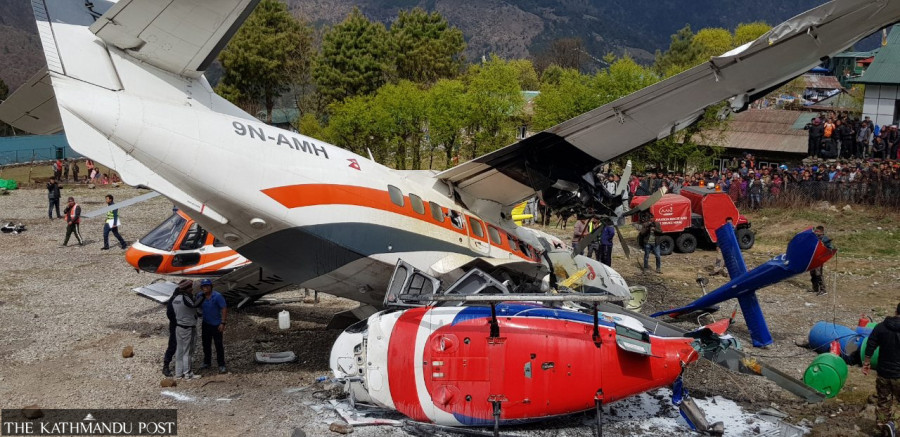Money
Nepal proposes minimum payout of $100,000 for death of air passenger
For domestic carriage in Nepal, current minimum compensation for death of a passenger is $20,000.
Sangam Prasain
Three years after adopting the Montreal Convention 1999, a universal treaty to govern airline liability around the world, Nepal has prepared a draft bill on a separate system of liability for domestic flyers.
The ‘air carriers' liability and insurance' draft bill has proposed a five-fold increase in compensation for airline passenger deaths and bodily injury.
According to the draft, a copy of which has been seen by the Post, domestic airlines have to pay a minimum compensation of $100,000 for injury or death of a passenger, once the bill is enacted into law.
This works out to approximately Rs11.9 million at current exchange rates ($1=Rs119.51), unless the airline proves that such damage was due not to its negligence or other wrongful act or omission.
Currently, for domestic carriage within Nepal, the minimum compensation for the death of a passenger is $20,000.
In cases of bodily injury or death, the draft of the bill says that the carrier shall make an advance payment where the carrier determines it is necessary to meet the immediate economic needs of, and hardships suffered by, a passenger or the families of the victims.
The claim for the compensation should be filed within 60 days of incident or accident at the airline or its agents, according to the proposed rule.
The draft was submitted to Tourism Ministry Secretary Maheshwor Neupane on Wednesday.
“We have prepared the draft bill after holding extensive discussions with various stakeholders, including the Airlines Operators Association of Nepal, the private sector body of the airline industry,” said Buddhi Sagar Lamichhane, joint-secretary at the Tourism Ministry, who led the team that drafted the legislation.
A nine-member team was constituted to prepare the draft.
“The draft will now be dispatched to Foreign, Home and Finance ministries for their comments,” said Lamichhane. “After their comments, it will be sent to the Law Ministry that will look whether the legal terms are appropriate or not.”
Then the draft bill will be tabled before the Cabinet.
Once the Cabinet gives in-principle approval, it will be registered at the Parliament Secretariat.
According to the draft, the carrier’s liability limitation for cargo lost, damaged or delayed shall be $20 per kg. Under the Montreal Convention 1999, a carrier's liability limitation for cargo lost, damaged or delayed shall be $26.63 per kg.
Civil aviation officials said it is a modified version of the Montreal Convention 1999 because there are a number of clauses that airlines would not be able to comply with.
The Montreal Convention 1999 came into force in Nepal on December 15, 2018.
It imposes strict liability on airlines in three cases: accidental death or bodily injury of a passenger while on board, embarking, or disembarking the aircraft, damage to cargo and damage resulting from delay of passengers, baggage, or cargo.
The draft of the bill for air carriers' liability and insurance for Nepal’s domestic airlines, however, has not taken into consideration the liability for delay, including unlimited claims.
The Montreal Convention 1999 imposes a minimum compensation of $113,100 Special Drawing Rights (SDR), equivalent to $157,814 for each passenger. This works out to approximately Rs18.8 million at the current exchange rates ($1=Rs 119.51), unless the airline proves that such damage was not due to its negligence or other wrongful act or omission.
The revised limit as of December 28, 2019 is 128,821 SDR, or $180,685 or Rs21.5 million.
SDR is a special currency issued by the International Monetary Fund (IMF) to use as international reserves and settle international accounts.
In any crash under the Montreal Convention 1999, the families of the victims have a right to claim unlimited compensation if it is a wrongful death.
“But in the case of domestic airlines, the airline cannot afford to bear the unlimited compensation that goes beyond the insurance amount,” said an official at the ministry.
Similarly, officials say that given Nepal’s geographical terrain, climatic behaviour and airport facilities, Nepali airlines cannot afford to bear liability for delays.
Under the Montreal Convention 1999, the liability for delay is limited to $6,580.94 per passenger.
According to the draft, the carrier is not liable to the extent of the delay that is caused by airport, air traffic control, security, and other facilities or personnel, whether public or private, not under the control and direction of the carrier.
The draft has also set the minimum compensatory damages for the third party. Under the proposed rule, the minimum compensatory damages for the third party by an aircraft weighing 10 tonnes or below, shall be $25 million.
Similarly, the minimum compensatory damages for the third party by an aircraft weighing up to 35 tonnes shall be $35 million and $60 million for the aircraft weighing above 35 tonnes.
Nepalis are flying like never before and setting all-time high records in domestic passenger numbers, airport figures showed.
In 2021, a horde of 3.54 million domestic fliers braved Covid restrictions and took to the skies, the highest number of air travellers recorded in the history of Nepali aviation.
According to Tribhuvan International Airport statistics, domestic air passenger numbers were up a sharp 11.08 percent from pre-Covid 2019 levels, as airlines dangled cheap tickets to attract travellers.
There are 20 airline companies in Nepal, including 10 fixed-wing operators.
The statistics show that the popularity of plane travel took off in 2021 after a disastrous 2020.
Domestic passenger traffic at Kathmandu’s Tribhuvan International Airport had fallen to its lowest level in 2020 since 2009.
Domestic airlines carried 1.45 million passengers in 2020, a 54.28 percent plunge from the 2019 figure.
Aircraft movements also dropped to a multi-year low of 38,610 takeoffs and landings, representing a steep 57.94 percent fall from the year before.




 20.12°C Kathmandu
20.12°C Kathmandu














